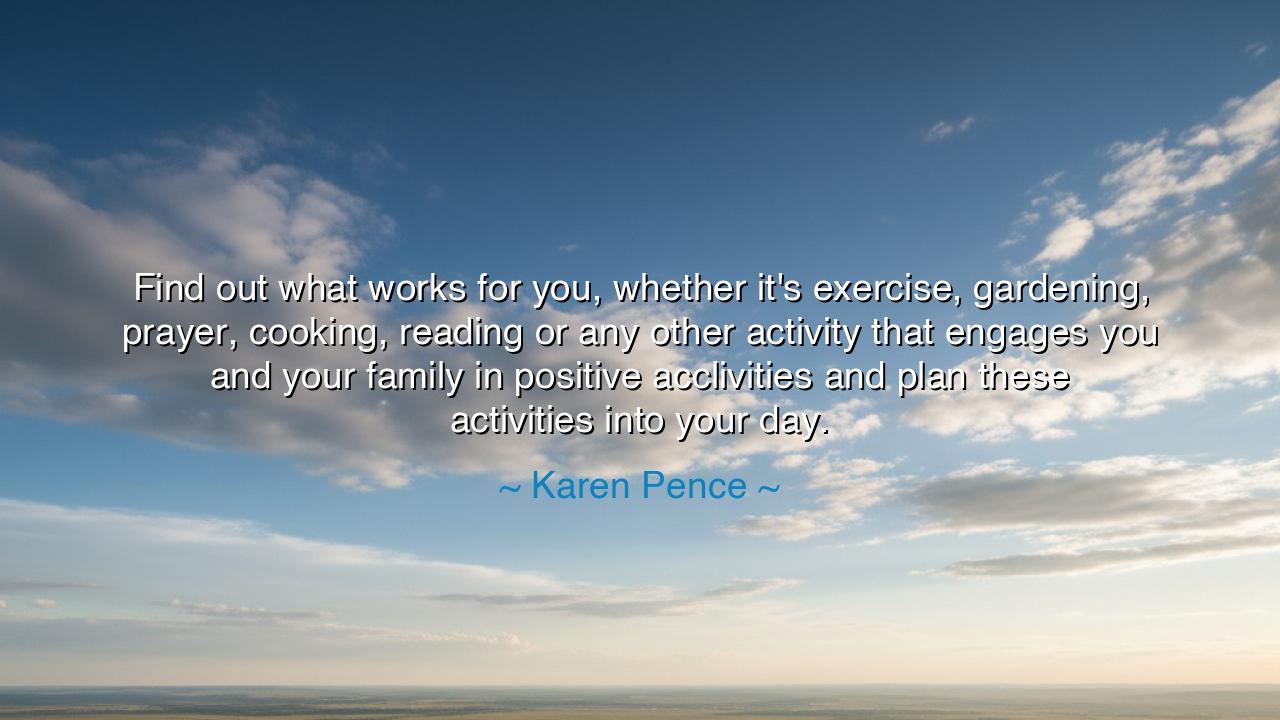
Find out what works for you, whether it's exercise, gardening
Find out what works for you, whether it's exercise, gardening, prayer, cooking, reading or any other activity that engages you and your family in positive acclivities and plan these activities into your day.






“Find out what works for you, whether it’s exercise, gardening, prayer, cooking, reading or any other activity that engages you and your family in positive activities, and plan these activities into your day.” Thus spoke Karen Pence, a woman of quiet strength and devotion, whose words carry the wisdom of balance and the serenity of mindful living. Though simple in appearance, this saying holds a truth as deep as the ancient rivers—that peace is not stumbled upon by chance, but cultivated through intention. In a world often torn by hurry, noise, and distraction, this counsel calls us to reclaim the sacred rhythm of daily life—to choose what nourishes the soul and weave it deliberately into each day.
The origin of this quote lies in a time of unrest and uncertainty. As Second Lady of the United States, Karen Pence spoke these words amid an age when families were strained by isolation, stress, and disconnection. Her message was not political, but profoundly human—a reminder that well-being begins at home, that inner calm is the soil from which compassion and strength grow. Like the sages of old who taught that order in the household leads to harmony in the world, she urged people to anchor their days in positive habits—simple acts that foster connection, joy, and renewal.
To “find out what works for you” is an invitation to self-knowledge. It is to listen inwardly, to discern what stirs your spirit and brings you peace. Some find healing in the rhythm of exercise, where the body and breath move as one. Others find it in gardening, where hands meet the earth, and life springs anew under their care. For some, it is prayer—that sacred dialogue between the soul and the Divine, restoring faith amid life’s storms. And for others still, it is the humble act of cooking, reading, or sharing time with loved ones. Whatever the form, these acts are not mere leisure; they are the rituals of restoration, the ways in which the human heart keeps itself whole.
This teaching echoes the wisdom of the ancients. The philosopher Aristotle once said that happiness is not found in fleeting pleasures but in “activity in accordance with virtue.” Likewise, the monks of centuries past understood the holiness of daily labor. They prayed while they tilled the soil, washed the floors, or copied sacred texts—believing that all work, done with purpose, could become a prayer in motion. In every age, those who live wisely have known this truth: peace is not passive. It must be built, tended, and renewed through conscious action.
Consider the story of Viktor Frankl, the Austrian psychiatrist and Holocaust survivor. Amid the despair of the concentration camps, he discovered that the human spirit can endure any suffering if it finds meaning in its daily acts. Prisoners who clung to a small ritual—a whispered prayer, a shared story, a moment of kindness—found light even in darkness. Frankl later wrote that survival itself often depended on “a why to live for.” In this way, Karen Pence’s counsel is not merely for times of comfort, but for times of trial. When the world grows uncertain, the soul must return to its anchors—to those small, steady actions that keep us human and whole.
To “plan these activities into your day” is to treat the soul with the same care we give the body. We schedule our duties and appointments, yet we often neglect what nourishes the spirit. But the ancients would say: a day without reflection or joy is a day unlived. Therefore, to plan your moments of rest, prayer, creativity, or companionship is not selfish—it is sacred stewardship. For a life lived without renewal soon grows weary, and a heart unwatered cannot bear fruit.
So, my child, heed this gentle wisdom: seek what strengthens your soul. Do not copy another’s rhythm, but discover your own. If gardening brings you peace, make time to plant. If reading lifts your thoughts, keep a book beside you. If prayer steadies your heart, rise early to commune with the Divine. Fill your days not only with tasks, but with meaning. For in the end, it is not how many things we have done, but how deeply we have lived that will matter.
Let your life become a garden of deliberate joys. Let each day hold space for something beautiful and true. And when evening comes and the sun sets upon your labors, you will find yourself at peace—knowing that you have walked wisely, lived fully, and used your hours as gifts entrusted by God Himself. For the secret of a good life lies not in its length or grandeur, but in its balance—between work and rest, between duty and delight, between the world’s demands and the quiet voice within that whispers: Be still, and live well.






AAdministratorAdministrator
Welcome, honored guests. Please leave a comment, we will respond soon